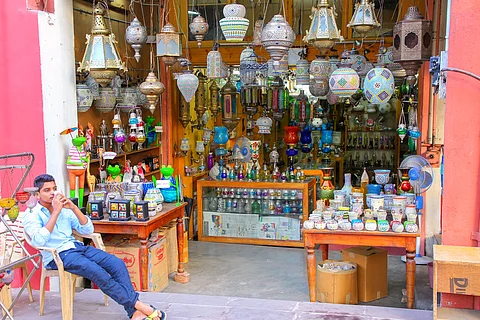
- Destinations
- Experiences
- Stay
- What's new
- Celebrating People
- Responsible Tourism
- CampaignsCampaigns
- SubscribeSubscribe
- Buy Now

Jaipur, the capital of Rajasthan, is famously known as the 'Pink City' for its terracotta-hued buildings. Founded in 1727 by Maharaja Sawai Jai Singh II, Jaipur is home to architectural marvels and royal charm. Must-visit sites include the majestic Amber Fort, the iconic Hawa Mahal with its lattice windows, the opulent City Palace, and the astronomical wonder Jantar Mantar, a UNESCO World Heritage Site. One of the favourite activities in Jaipur is shopping, which offers exquisite handicrafts, jewelry, textiles, and more. The Pink City is just as famous for its colourful bazaars as it is for its royal palaces. Among the oldest markets is Johari Bazaar, located near the iconic Hawa Mahal. It’s a sensory treat that reflects the city’s regal heritage, and the perfect place to sample traditional sweets and kachoris while you shop.
Johari Bazaar in Jaipur was established around the 18th century, coinciding with the founding of the city by Maharaja Sawai Jai Singh II. He envisioned Jaipur as a planned city and designated specific areas for different trades, including Johari Bazaar for jewelry. The bazaar became a popular spot for jewellery craftsmen and traders, attracting royalty and becoming known for its exquisite jewelry and gemstone pieces.
Spread over two kilometers and home to more than 400 shops, this bustling market is renowned for its jewellery, textiles, and traditional Rajasthani attire. Johari Bazaar is a treasure trove for those seeking handmade jewellery, gemstones, and intricate fabrics. It is considered one of the oldest markets in Jaipur.
This bustling marketplace is a glittering labyrinth of gems, mirror-work fabrics, and ethnic finery. Traditionally a daytime market, Johari Bazaar experiences a revival in the evening during festivals and wedding seasons, staying open late to cater to shoppers. Visiting after sunset, you’ll find the market illuminated by hanging lanterns and filled with the lively sounds of bargaining voices. Here is a guide to what to shop for.
Johari Bazaar is renowned for its extensive range of jewellery, including precious and semi-precious stones and gold and silver items featuring intricate designs. In this market, you can discover a diverse selection of jewellery, such as gold, diamonds, rubies, emeralds, silver, and semi-precious stones. The market is particularly famous for its unique Thewa and lac jewellery. You can also find stunning Kundan jewellery, known for its detailed designs incorporating coloured glass and gemstones set in gold or silver. Additionally, Meenakari jewellery, which features vibrant enamel work, adds a splash of colour to the pieces. Another popular style is Jadau jewellery, characterised by intricate designs with embedded gemstones in gold or silver settings. Lastly, Polki jewellery showcases uncut diamonds, often displayed in elaborate settings with intricate detailing.
Jaipur is renowned for its diverse range of textiles, particularly traditional Rajasthani fabrics such as leheriya (tie-dye) and bandhej (tie-dye). These vibrant fabrics are commonly used for sarees, dupattas, and scarves. You can find an excellent selection of leheriya and bandhej fabrics in Johari Bazar, known for their intricate patterns and vivid colors. You will also get a wide array of sarees and dupattas crafted from various fabrics, including the popular leheriya and bandhej. Additionally, block-printed fabric, featuring detailed patterns and earthy tones, is another popular choice available in Johari Bazaar.
Johari Bazaar is an excellent place to discover traditional Rajasthani handicrafts. You can find leather goods such as mojaris and jutis, as well as lampshades and bags. Additionally, don't miss the opportunity to purchase famous blue pottery, a craft unique to Jaipur. This pottery features a striking blue color achieved with cobalt oxide and is known for its delicate floral and geometric designs. Many shops in Johari Bazaar specialize in blue pottery, offering a variety of items from decorative wall hangings to functional tableware. Black metal handicrafts, known for their unique aesthetic, are also popular among visitors. You can also find carved and painted wooden items, including sculptures and figurines.
While you're in the area, be sure to sample some delicious Rajasthani street food. Set aside time during your shopping spree for a hearty Rajasthani meal, or indulge in the famous sweet treats. Both tourists and locals flock to LMB (Lakshmi Mishtanna Bhandar) in Johri Bazaar, which offers a wide variety of authentic Rajasthani dishes and sweet delicacies.
Johri Bazaar in Jaipur is a haven for wedding shopping, known for exquisite pieces offered at reasonable prices. Accessorising your bridal attire with jewellery is just as important as selecting your trousseau, and Johri Bazaar has everything you need in this regard. You can find a wide variety of items, from necklaces and gold headbands to toe rings and bracelets.
Best Time to Visit: The cooler months from October to March are generally considered the ideal time to visit Johari Bazaar in Jaipur, as the weather is more pleasant.
Timings: The market typically opens around 10 AM and remains busy until the evening. Weekdays are usually less crowded than weekends.
